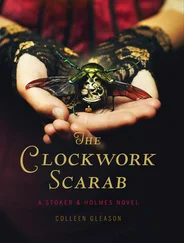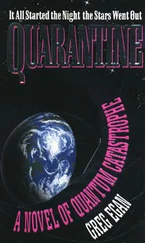Greg Egan - The Clockwork Rocket
Здесь есть возможность читать онлайн «Greg Egan - The Clockwork Rocket» весь текст электронной книги совершенно бесплатно (целиком полную версию без сокращений). В некоторых случаях можно слушать аудио, скачать через торрент в формате fb2 и присутствует краткое содержание. Жанр: Фантастика и фэнтези, на английском языке. Описание произведения, (предисловие) а так же отзывы посетителей доступны на портале библиотеки ЛибКат.
- Название:The Clockwork Rocket
- Автор:
- Жанр:
- Год:неизвестен
- ISBN:нет данных
- Рейтинг книги:3 / 5. Голосов: 1
-
Избранное:Добавить в избранное
- Отзывы:
-
Ваша оценка:
- 60
- 1
- 2
- 3
- 4
- 5
The Clockwork Rocket: краткое содержание, описание и аннотация
Предлагаем к чтению аннотацию, описание, краткое содержание или предисловие (зависит от того, что написал сам автор книги «The Clockwork Rocket»). Если вы не нашли необходимую информацию о книге — напишите в комментариях, мы постараемся отыскать её.
The Clockwork Rocket — читать онлайн бесплатно полную книгу (весь текст) целиком
Ниже представлен текст книги, разбитый по страницам. Система сохранения места последней прочитанной страницы, позволяет с удобством читать онлайн бесплатно книгу «The Clockwork Rocket», без необходимости каждый раз заново искать на чём Вы остановились. Поставьте закладку, и сможете в любой момент перейти на страницу, на которой закончили чтение.
Интервал:
Закладка:
On the journey back to Zeugma, Yalda managed to find one solution to Nereo’s equation herself: the equivalent of the potential energy around a motionless, point-like mass.
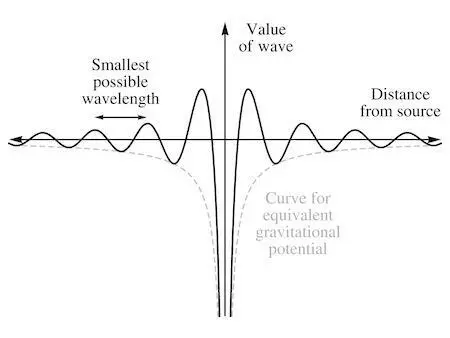
For gravity, it had been known since the work of Vittorio an era and a half ago that the potential was inversely proportional to the distance from the mass. For light, the overall strength of the wave diminished with distance in exactly the same fashion, but it also underwent an oscillation with the smallest possible wavelength—that of a wave traveling at infinite speed. All of this was just an idealization—the need to wrap around the cosmos smoothly would impose additional constraints and complications—but it was a start.
Yalda pondered the curve. Perhaps there was something like this present in everything from sunstone to a flower’s petals. Light at the minimum wavelength would be invisible, so when the source was motionless the petals would be dark. But a system of oscillating sources, suitably arranged, might well be able to twist the original pattern into a set of tilted wavefronts, corresponding to light slow enough to lie in the visible realm.
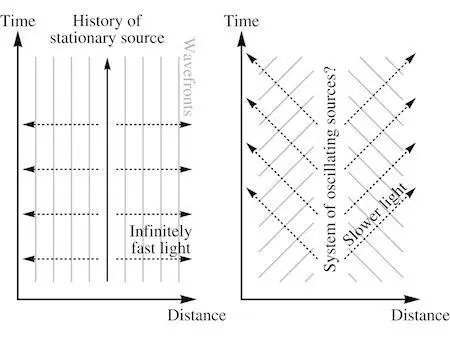
Exact solutions when the source was in motion wouldn’t be easy to find, but the general idea made sense; to generate a wave that moved energy around, something had to feed in the energy in the first place, whether that meant jiggling the end of a string or vibrating your tympanum in air. That the creation of light would draw true energy out of an oscillating source—increasing its kinetic energy, rather than draining it—was a peculiar twist, but that was rotational physics for you.
There was, Yalda realized, another strange twist, arising from Nereo’s choice of a vector aligned with the particle’s history as the term to add to the equation. If you accelerated a light source long enough to curve its history around a half-circle and send it backward in time… then once it was settled on its new, straight trajectory it would be surrounded by a wave that was the opposite of the original. Compared with its earlier self, the pattern of light the source generated would now appear upside-down.
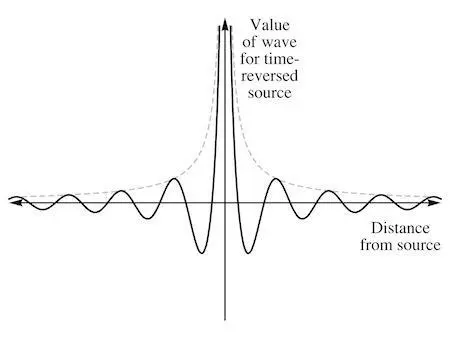
But how could a featureless speck of matter tell which way it was traveling through time? The arrow of time was meant to come solely from entropy’s rise; a lone particle couldn’t grow disordered . A wave changing sign wasn’t as dramatic as the difference between a stone being smashed and the shards spontaneously reassembling, but it did imply that there might be two distinguishable kinds of source, at least when they weren’t moving too rapidly: one “positive”, one “negative”.
It was evening when the train pulled into Zeugma. Yalda didn’t have the energy to face the four squabbling brats at bedtime, so she wandered around the city center for a while, killing time until she was sure they’d be asleep.
When she finally braved the apartment, she was surprised to find Lidia sitting in the front room, in the dark.
“I thought you’d be at work,” Yalda said. “Did they change your shift—or was there some problem with the helper?” The whole point of asking Eusebio to pay her had been to hire someone to watch the children in her place.
“The helper was fine,” Lidia said, “but we didn’t need her tonight.”
“So you’re working mornings again?”
“No, I’ve lost my job.”
“Oh.” Yalda sat beside her. “What happened?”
“Did I tell you about my new supervisor?”
“The idiot who kept asking you to become his deserted brother’s co-stead?” Yalda didn’t believe the rumor that Lidia had murdered her own co, but there were times when it might have been helpful if more people had taken it seriously.
Lidia said, “Two days ago he came up with a new offer: either I hand the children over to his brother, or he tells the factory owner that I’ve been stealing dye.”
“But you only ever took from the spoiled batches. I thought everyone did that!”
“They do,” Lidia replied. “But he told the owner I was taking good jars as well. He had some kind of paperwork prepared, inventory records that made it look plausible. So the owner believed him.”
“What a piece of shit.” Yalda put an arm across her shoulders. “Don’t worry, you’ll find a better job.”
“I’m just tired,” Lidia said, shivering. “I used to think everything would be different by now—by the time I was this old. But what’s changed? There aren’t even women on the Council.”
“No.”
“Why doesn’t your friend Eusebio do something about that?” Lidia demanded.
“Don’t blame him,” Yalda pleaded. “He’s already fighting the Council on a dozen different fronts.”
Lidia was unimpressed. “The whole point of being a new member of the Council is to fight the old guard and get something useful done. But sharing power never seems to be a priority with anyone.”
“Shocking, isn’t it?”
“Will he have free holin on his rocket?” Lidia wondered. “I might join up for that alone.”
Yalda said, “Of course there’ll be free holin. In fact, it looks as if the entire crew will consist of solos and runaways: one of each, in a rocket the size of this room.”
“That’s beginning to sound less tempting.”
Yalda rose. “I’m sorry about your job. I’ll ask around, see if anyone knows of a position…”
“Yeah, thanks.” Lidia put her head in her arms.
As Yalda crossed the room, a slab of sharp-edged brightness on the floor beside the window caught her eye. The diffuse light from the Hurtlers didn’t look like this; it was as if one of their neighbors had stolen a spotlight from the Variety Hall and mounted it on their balcony.
She walked over to the window and looked out. The neighbors weren’t to blame; the light was coming from high above the adjacent tower. A single bluish point was fixed in the sky, displaying no discernible color trail.
Lidia had noticed the light too; she joined Yalda by the window.
“What is it?”
Yalda suddenly realized that she’d seen the same object high in the east when she’d walked out of the railway station—but it had been a great deal paler then, so she hadn’t given it a second thought. “Gemma,” she said. “Or Gemmo.” The naked eye couldn’t separate them, so there was no point guessing which of the two had suffered the change.
Lidia hummed with exasperation; she was in no mood to be mocked. “I might not be an astronomer,” she said, “but I’m not a fool. I know what the planets look like, and none of them are that bright.”
“This one is, now.” A dark, lifeless world that had once shone by nothing but reflected sunlight was turning into a star before their eyes.
Lidia steadied herself against the window frame; she’d grasped Yalda’s meaning. “A Hurtler struck it? And this is the result? ”
“It looks that way.” Yalda was surprised at how calm she felt. Tullia had always believed that a large enough Hurtler could set the world on fire. Dark world, living world, star; they were all made of the same kinds of rock, the distinction was just a matter of luck and history.
Lidia said, “Now tell me the good news.”
Good news? Gemma and Gemmo were far away, and much smaller than the sun, so at least the world wouldn’t suffer intolerable heating from the new star.
Читать дальшеИнтервал:
Закладка:
Похожие книги на «The Clockwork Rocket»
Представляем Вашему вниманию похожие книги на «The Clockwork Rocket» списком для выбора. Мы отобрали схожую по названию и смыслу литературу в надежде предоставить читателям больше вариантов отыскать новые, интересные, ещё непрочитанные произведения.
Обсуждение, отзывы о книге «The Clockwork Rocket» и просто собственные мнения читателей. Оставьте ваши комментарии, напишите, что Вы думаете о произведении, его смысле или главных героях. Укажите что конкретно понравилось, а что нет, и почему Вы так считаете.




